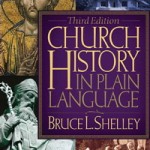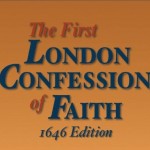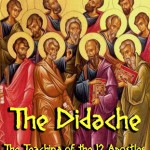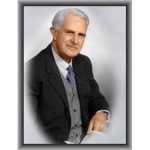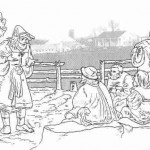Replay: Getting to know the real Patrick of Ireland
So, today is St. Patrick’s Day, a day for green beer, corned beef, and all things Irish. I’ve written a few posts about Patrick of Ireland in the past. My favorite is the post that I wrote last year called, “Three Quotes from Paddy.” You see, we know alot about the legends surrounding Patrick. But, did you know that we actually have some of his writings? It’s true. So, here is a post about his Confessio.
———————————
Three Quotes from Paddy
Last night, I read back through Confessio by Patrick (of Ireland), Paddy to his friends.
I love the story that he tells about being away from God, then being taken into slavery and turning to God. He talks about being rejected up his return because of his lack of education. He talks about his love for God and for the people of Ireland.
I especially appreciated these three quotes, and I hope you enjoy them also. The first quote is about his motivation for sharing the gospel of Jesus Christ:
Therefore, indeed, I cannot keep silent, nor would it be proper, so many favours and graces has the Lord deigned to bestow on me in the land of my captivity. For after chastisement from God, and recognizing him, our way to repay him is to exalt him and confess his wonders before every nation under heaven.
In the second quote, he describes how the love of God brought him to a point where he could humbly serve others:
Me, truly wretched in this world, he inspired before others that I could be — if I would — such a one who, with fear and reverence, and faithfully, without complaint, would come to the people to whom the love of Christ brought me and gave me in my lifetime, if I should be worthy, to serve them truly and with humility.
The final quote is an entreaty and challenge for those who read his confession:
But I entreat those who believe in and fear God, whoever deigns to examine or receive this document composed by the obviously unlearned sinner Patrick in Ireland, that nobody shall ever ascribe to my ignorance any trivial thing that I achieved or may have expounded that was pleasing to God, but accept and truly believe that it would have been the gift of God.
There is no golden age of Christianity
Christoper at “A New Testament Student” is preparing for his first seminary course, Survey of Church History, by reading one of the required books. He wrote about his response to the book in a post called “History.”
The book that he read is a very good book on church history called Church History in Plain Language by Bruce L. Shelley. If you haven’t read it, you should.
Here’s the first “realization” that Christopher came to after reading this book:
First, There is no golden age of Christianity. Each age holds its own flaws, and each leader his or her own failings. The patriarchs, the Roman Catholics, the reformers, the emperors, even the apostles struggled in their understanding of God, and how we relate to Him. As a Christian growing up in the evangelical tradition, I have heard a great deal of praise attributed to the apostles and reformers contrasted by sharp criticism, if not hatred, for all things Roman Catholic. While I am a protestant, reading this text has opened my eyes up to an important truth. The Gospel did not pass away between the fourth and sixteenth centuries only to be resurrected by the Reformation. The name of Christ remained a focal point for a millenium in the midst of plagues, persecutions, and political strife, and the Catholic practice of monasticism preserved all of the ancient writings, including the Scriptures, that brought the reformers to their powerful conclusions. There may have been many distorted and overlooked truths, but there were men who stood firm in their trust of Christ and worshipped Him in the way their culture taught them was appropriate.
Much of the New Testament was written to correct problems that had already cropped up among those early churches. As early as Acts 5 and Acts 6, we see problems in the church. So, Christopher is right… there is no golden age. Of course, if there were no problems among the churches, we may not know as much about them as we do today.
Think of it this way… because of the problems and struggles and issues in the early church, we know how we should respond and live today.
What do you think? Was there a golden age of Christianity?
Replay: Following Ignatius instead of Scripture
Three years ago, I wrote a post called “Following Ignatius.” When I first read Ignatius’ letters, I remember being encouraged by his focus on the gospel. But, I was perplexed by the weight that he put on the monoepiscopacy (single bishop, multiple presbyters, and multiple deacons in each city). Ignatius admits that he did not learn this from any of the apostles or any other men, but it was instead revealed to him directly by the Holy Spirit. But, I don’t know why I was surprised by the focus Ignatius placed on the bishop, since I had seen that same focus in all the churches I’d ever been part of. Oh, they didn’t focus on the bishop… but on the “senior pastor.”
———————————-
Ignatius of Antioch was one of the earliest Christian writers following the apostles. He died sometime around 110 AD in Rome. After being arrested in Antioch, he was led to Rome through Asia Minor. On the way, he wrote seven letters, six to churches and one to Polycarp.
Ignatius was very interested in the gospel. Ignatius’ gospel was a literal interpretation of the historical events and persons surrounding the birth, life, death, burial, resurrection, and continuing ministry of Jesus Christ. His desire was to see Christians living in harmony with the one gospel.
In order to exhort Christians toward harmony with the one gospel, Ignatius also encouraged them toward a three-part church leadership structure that included one bishop, multiple elders, and multiple deacons per city.
Evangelicals are proud of the fact that we follow Scripture and not traditions such as those espoused by Ignatius. But, do we follow Ignatius over Scripture? You can judge for yourself…
By being subject to the bishop and the elders, you might be sanctified concerning all things. (Ign. Eph. 2.2b)
Let us make every effort then not to oppose the bishop in order that we might submit ourselves to God. (Ign. Eph. 5.3b)
Therefore, as the Lord did nothing without the Father, being united with him, neither by himself nor by the apostles, in the same way you must do nothing without the biship and the elders. (Ign. Mag. 7.1a)
The one who does anything without the bishop, the elders, and the deacons, such a man is not clean in his conscience. (Ign. Trall. 7.2b)
Let that Eucharist be considered proper which is either by the bishop or by the one he permits. (Ign. Smyr. 8.1b)
It is not proper to baptize or to have a “love feast” without the bishop. (Ign. Smyr. 8.2b)
The one who honors the bishop is honored by God; the one who does anything without the knowledge of the bishop serves (worships?) the devil. (Ign. Smyr. 9.1b)
It is fitting for men and women who marry to make there union by the approval of the bishop. (Ign. Pol. 5.2b)
These are only a few of the passages. I left out passages where Ignatius said that same thing to different churches. So, according to Ignatius, believers should do nothing with the consent of the bishop and elders. In fact, those who do anything without their leaders obviously have impure motives (unclean conscience). No one should have a love feast (Eucharist, communion) or baptize without the bishop’s approval. No one should get married without the bishop’s approval. If believers stay within the bishop’s will, then they are sanctified. If they move outside the bishop’s will, then they are in trouble, actually going against God himself to serve the devil.
Change “bishop” to “senior pastor”, and I think this fits very closely with many modern teachings concerning church leadership. You can especially find these types of teachings under topic of spiritual “covering”. But, I don’t think you’ll find these in Scripture.
Are we willing to admit that in many of our leadership concepts and practices in the church we follow Ignatius more closely than we follow Scripture?
The Early Baptists and the Church
Guy at “The M Blog” as written a fascinating post called “Baptist Identity.”
In his post, Guy quotes from the First London Baptist Confession of Faith of 1646. Specifically, he quotes several passages from the confession that deal with the church. Also, Guy highlights sections of those quotes that most baptistic churches today would find interesting, odd, and unfamiliar.
For example, here is part of the first quote:
XXXVI.
BEING thus joined, every church hath power given them from Christ, for their wellbeing, to choose among themselves meet persons for elders and deacons, being qualified according to the word, as those which Christ hath appointed in His testament, for the feeding, governing, serving, and building up of His Church; and that none have any power to impose either these or any other.
Guy includes seven such quotations (along with his short comment). The quotations deal with church leaders, church meetings, baptism, and even every member ministry.
What are your thoughts about these passages from the London Baptist Confession?
Three Quotes from Paddy
Last night, I read back through Confessio by Patrick (of Ireland), Paddy to his friends.
I love the story that he tells about being away from God, then being taken into slavery and turning to God. He talks about being rejected up his return because of his lack of education. He talks about his love for God and for the people of Ireland.
I especially appreciated these three quotes, and I hope you enjoy them also. The first quote is about his motivation for sharing the gospel of Jesus Christ:
Therefore, indeed, I cannot keep silent, nor would it be proper, so many favours and graces has the Lord deigned to bestow on me in the land of my captivity. For after chastisement from God, and recognizing him, our way to repay him is to exalt him and confess his wonders before every nation under heaven.
In the second quote, he describes how the love of God brought him to a point where he could humbly serve others:
Me, truly wretched in this world, he inspired before others that I could be — if I would — such a one who, with fear and reverence, and faithfully, without complaint, would come to the people to whom the love of Christ brought me and gave me in my lifetime, if I should be worthy, to serve them truly and with humility.
The final quote is an entreaty and challenge for those who read his confession:
But I entreat those who believe in and fear God, whoever deigns to examine or receive this document composed by the obviously unlearned sinner Patrick in Ireland, that nobody shall ever ascribe to my ignorance any trivial thing that I achieved or may have expounded that was pleasing to God, but accept and truly believe that it would have been the gift of God.
Patrick of Ireland Was No Saint
I mean, how could someone who is celebrated with large quantities green beer and corned beef and turning rivers green be a saint?
But, in reality, my status is both true and false.
First, it’s true because Patrick was never canonized by the Roman Catholic Church, and so he is not officially a “Saint.” However, he does have a feast day (March 17, of course).
You see, Patrick lived in Scotland and Ireland around the 5th century (~387 – ~493) before the Bishop of Rome (Pope) formally sent a representative to the British Isles. (Of course, Christianity was already there, but that’s beside the point.) There were no bishops or cardinals or any other church officials to officially canonize Patrick.
So, while Patrick is venerated by the Orthodox Church (especially English speaking Orthodox churches), the Roman Catholic Church never granted sainthood status to him.
This is very interested to me. Besides St. Nicholas (Santa Clause) and St. Valentine (who is probably a conglomeration of many people), more people in American culture probably know “Saint Patrick” more than any other “Saint.” In fact, many people now call “Saint Valentine’s Day” simply “Valentine’s Day.” But, it’s still “Saint Patrick’s Day.” Except, Patrick is not a Saint.
Or is he? You see, in another way, Patrick is a saint.
While the legends state that Patrick removed all snakes from Ireland, he is actually known most for his evangelism. In fact, he was an apostle, being sent from Scotland to Ireland to proclaim the gospel of Jesus Christ. And, where did Patrick go first? To his master.
You see, when Patrick was a teenager in Scotland, he was not interested in God, although his parents tried to teach him. He was captured in a pirate raid and sold into slavery in Ireland. While he served his master as a shepherd, he began to pray fervently and developed a deep love for God.
After six years of slavery, he escaped (or was released) and returned to Scotland. Once he returned, he sensed God telling him to return to Ireland and to proclaim the gospel there. So, he went.
So, by all accounts, Patrick was a “saint” in the sense that the word is used in Scripture. That is, Patrick was one of God’s children who are set apart from the world. He was a “holy one” – a saint.
Was Patrick a saint? Well, not officially according to the Roman Catholic Church.
But, he was a saint in the only way that’s really important. He was a saint because God called him out of the world to become one of his children.
The Didache: Gather together frequently
I have been progressing slowly (very slowly) on my dissertation. (In case you forgot, my dissertation is titled “Mutual Edification as the Purpose of the Assembled Church in the New Testament: A Study in Biblical Theology.”) Currently, I’m studying what various Christians wrote about the assembled church in different time periods of church history.
Lately, I’ve been studying the Didache. The first part of the Didache (chapters 1-6) deals with the “two ways”: the way of life and the way of death. Many of the exhortations echo what we read in Scripture.
The last part deals with various practical (as if the way of life is not practical) aspects of living together as the church. The author discusses baptism, fasting, the Lord’s Supper / Eucharist (which those eating leave “filled”), various traveling servants (apostles, prophets, teachers), local servants, and choosing elders and deacons.
The conclusion of this book begins with an exhortation to “be on the alert”! What does he want them alert about? Well, several things, but gathering together is one of those things. Here is that passage:
Now, gather together frequently seeking those things which are fitting for your lives. For the whole time of your faith will not benefit you if you are not made mature by the last time. (Didache 16:2 author’s translation)
The author of the Didache tells his readers to gather together for one purpose: to seek those things which are fitting (proper) for your lives (souls). (Interestingly, worship is not mentioned in this passage.) What are the things that are fitting for their lives?
He says that the entire time of their faith (the entire time of living by faith?) will only benefit them if they mature by the end of their lives. Thus, he wants them to mature; he expects them to mature. In fact, the language is quite shocking. If they do not mature (in the context of their meeting together), then their entire time of faith will be of no benefit.
This sounds very similar to Hebrews 10:24-25:
And let us consider how to stir up one another to love and good works, not neglecting to meet together, as is the habit of some, but encouraging one another, and all the more as you see the Day drawing near. (Hebrews 10:24-25 ESV)
The Epistle of Barnabas (another early Christian writing) also has a similar passage:
For this reason, we should be attentive in these last days; for the whole past time of your life and faith will be of no benefit to us, unless now in this wicked time we should stand against coming temptation, as is suitable for children of God. Therefore, in order that the Black One may find no means of entrance, we should flee from every futility (frustration?), and we should completely hate the works of the way of evil. Do not live separate lives, by each going his own way, as those who have already been justified; but by coming together in harmony, you must discuss what leads to the benefit of all. (Barnabas 4:9b-10)
In the Didache passage, notice the words the author uses to describe the expected gathering: “frequently” and “fitting for your lives.” Also, notice the verbs used to describe the gathering: “benefit” and “made mature.”
Similar phrases are found in the Hebrews passage: “not neglecting,” “love and good works,” and “encouraging.” And, similarly, we find these in the passage from the Epistle of Barnabas: “benefit,” “stand against temptation,” “suitable,” and “harmony.”
While there are some differences in this descriptive terms (some positive, some negative, for instance), they are very similar. And, the instructions were given to all the readers, not just the leaders. (That’s true of Hebrews, the Didache, and Barnabas – all written to and addressed to all believers, not just to overseers, elders, deacons, teachers, prophets, apostles, etc.)
Should we still expect these same types of phrases to describe our gatherings? Is it still the responsibility of all the believers, or just the leaders?
Who was T. Austin Sparks?
Josh at “Called to Rebuild” has written an excellent short biography of T. Austin Sparks in his post “Meet T. Austin Sparks.”
If you are interested in more simple / more organic expressions of the church, then you definitely want to read Josh’s post. And, you will probably want to read more about and by Sparks who lived from 1888-1971 and who moved away from more institutional forms of church when he was in his thirties (1926).
Here’s the first paragraph of Josh’s biography:
Theodore Austin Sparks was born in London, England in 1888. His life and ministry extended well into the 20th century, based out of his home in Honor Oak. Sparks was ordained a pastor in the Baptist denomination at the age of 25, but not long into his tenure he experienced a personal crisis of conscience, stemming from a new and altogether revolutionary apprehension of the Person of Jesus Christ and God’s eternal purpose concerning Him.  It was an encounter of such significance that it led him to abandon the title “Reverend†and withdraw his connection to the institutional church system of his day.
It seems that Sparks was dealing with some of the same issues that we’re facing today – around 100 years ago.
Have you read anything by Sparks? Do you know anything about him? What can you share with my readers?
The Christians support not only their own poor, but ours as well
While I was doing some research, I ran across this quote from Julian (the Apostate). (I’ve published the quote before, but decided to do so again.) History (primarily Christian history) has given Julian the name “the Apostate” because he attempted to move the Roman Empire back toward paganism after Constantine.
What alot of people may not know is that the Roman emperors following Constantine fluctuated between Christianity (of differing forms) and paganism. Julian was one of those who wanted the empire to return to the pagan religions of Rome’s past and thus remove the curses of the gods and return to their favor.
Anyway, at one point, Julian complained about the Christians (“Galileans”). I thought you might like to read his complaint:
Why do we not observe that it is their [the Christians’] benevolence to strangers, their care for the graves of the dead, and the pretended holiness of their lives that have done most to increase atheism [unbelief of the pagan gods]?… For it is disgraceful that, when no Jew ever has to beg, and the impious Galileans [Christians] support not only their own poor but ours as well, all men see that our people lack aid from us. Teach those of the Hellenic faith to contribute to public service of this sort.
It is too bad that most Christians have since given up caring for their own poor, much less caring for poor unbelievers. Perhaps more would have this same complaint if we turned back to “the Way” taught by Jesus.
But, hey, at least we have better doctrine now.
The Secret of the Strength
Last week (and apparently last year), Rod suggested that I read The Secret of the Strength (alternate url that stopped working) by Peter Hoover. After reading it, I wish that I had done so last year when he first suggested it.
The Secret of the Strength tells the story of the Anabaptists. The author is a descendant of the Anabaptists, and some of his stories revolve around his own family. Most chapters begin with the story of an Anabaptist, which is then followed by Anabaptist quotations intermixed with Hoover’s commentary.
Trust me, you will not agree with everything that you read. In fact, the Anabaptists did not agree with one another on many aspects of theology. However, they did agree on several basic teachings, primarily that Jesus was with them, and that their “strength” came from him alone.
By the way, if you number the “Reformers” among your heroes, this book may force you to question their status, especially when you read the reasons that many Anabaptists were killed.
The last few chapters are the most discouraging to me. The author begins the book by telling how the Anabaptists exploded, taking their faith with them and proclaiming the gospel wherever they went. At the end of the book, the author tells how the Anabaptists imploded, separating from one another over issues completely unrelated to the gospel.
If you decide to read this book – or if you’ve read it in the past – please add your comments here.


